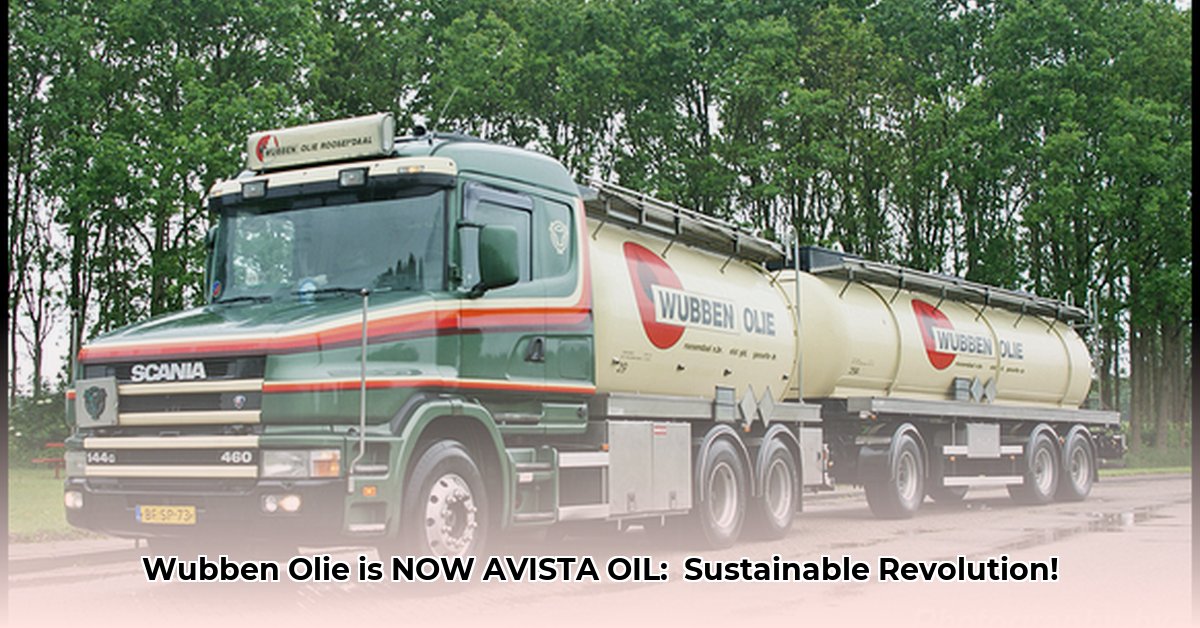
A New Chapter for Dutch Waste Oil Recycling
Wubben Olie, a prominent player in the Dutch waste oil recycling market, has undergone a significant transformation, rebranding itself as AVISTA OIL BV effective September 1st, 2024. This isn't merely a cosmetic change; it represents a strategic alliance with the international AVISTA OIL Group, promising enhanced operational efficiency and a broadened reach in the sustainable recycling sector. This rebranding underscores a commitment to pushing the boundaries of environmental responsibility and solidifying the company's position within a rapidly evolving industry. How will this affect the Dutch recycling landscape?
More Than a Name Change: A Global Strategy
The transition from Wubben Olie to AVISTA OIL BV is akin to a local business joining a multinational corporation. The core service—high-quality waste oil recycling—remains unchanged, but the integration provides access to global resources, cutting-edge technology, and a significantly expanded market presence. This strategic move positions AVISTA OIL BV for substantial growth, both domestically and internationally, impacting not only the company's future but also the broader landscape of sustainable waste management in the Netherlands.
Does this mean increased competition in the Dutch market? Absolutely. But it also signifies a heightened focus on sustainability and innovation, potentially prompting competitors to elevate their own standards.
Impact Across the Board
The rebranding's effects ripple across various stakeholder groups:
| Stakeholder Group | Immediate Effects | Long-Term Outlook |
|---|---|---|
| AVISTA OIL BV | Streamlined operations, boosted global brand recognition, access to advanced technology. | Increased market share, expanded service offerings, potential for international expansion and innovation. |
| Customers | Uninterrupted high-quality service under a new brand identity. | Broader service options, potentially improved value and even more sustainable solutions. |
| Competitors | Intensified competition, necessitating focus on innovation and sustainability. | Need for strategic adaptation to maintain competitiveness in a rapidly evolving market. |
| Government & Regulators | Enhanced possibilities for collaboration on sustainable waste management initiatives. | Potential for greater cooperation and support for environmentally friendly innovations in the sector. |
Sustainability Remains Paramount
AVISTA OIL BV’s rebranding is not a mere marketing exercise; it underscores a continued commitment to environmentally responsible waste oil recycling. Building upon Wubben Olie’s strong reputation, AVISTA OIL BV aims to further refine its processes, enhancing efficiency and minimizing environmental impact. This commitment to sustainability is likely to translate into increased investment in research and development, leading to even more innovative and eco-friendly solutions.
“This rebranding reflects our unwavering commitment to sustainable practices and cutting-edge technology within the waste oil recycling industry,” says [Full Name and Title], [Position] at AVISTA OIL BV. "Joining the AVISTA OIL Group allows us to leverage greater resources and expertise to further our sustainability goals."
The Future of Waste Oil Recycling in the Netherlands
AVISTA OIL BV’s transformation signals a significant shift in the Dutch waste oil recycling sector. The company's success isn't merely a matter of if, but how it will reshape the industry. How will AVISTA OIL BV leverage its global network to drive innovation and efficiency? Time will tell. But the prospects for more sustainable and effective waste oil recycling in the Netherlands, and potentially beyond, are undeniably brighter.
How to Improve Sustainable Waste Oil Recycling Processes in the Netherlands
The Netherlands is a leader in circular economy principles. But continuous improvement is key, particularly in waste oil recycling. AVISTA OIL BV's rebranding highlights this need for advancement. How can we enhance these processes even further?
A Multi-faceted Approach to Optimization
Improving sustainable waste oil recycling in the Netherlands necessitates a collaborative effort across several key areas:
Technological Innovation: Investing in R&D for advanced recycling technologies, including chemical recycling and efficient purification methods, is crucial for greater resource recovery and reduced environmental impact. This requires significant investment in research and development.
Infrastructure Development: Expanding and upgrading existing facilities, and constructing new ones to meet growing waste oil volumes, is essential for efficient processing and handling. This should include the development of centralised recycling hubs.
Policy Refinement: Government regulations and Extended Producer Responsibility (EPR) schemes should be constantly reviewed and adjusted to stimulate sustainable practices among producers and consumers. This will ensure that the economic incentives align with sustainability goals.
Public Awareness Campaigns: Educating the public on the importance of proper waste oil disposal and the benefits of sustainable recycling is crucial for raising participation rates and ensuring responsible handling of waste.
International Collaboration: Sharing best practices and collaborating with international partners on innovative waste management strategies can expedite progress and enhance efficiency. This collaboration can foster innovation and efficient resource management.
This strategic approach requires collaboration between government, industry, and the public to achieve a more sustainable and robust waste oil recycling system.